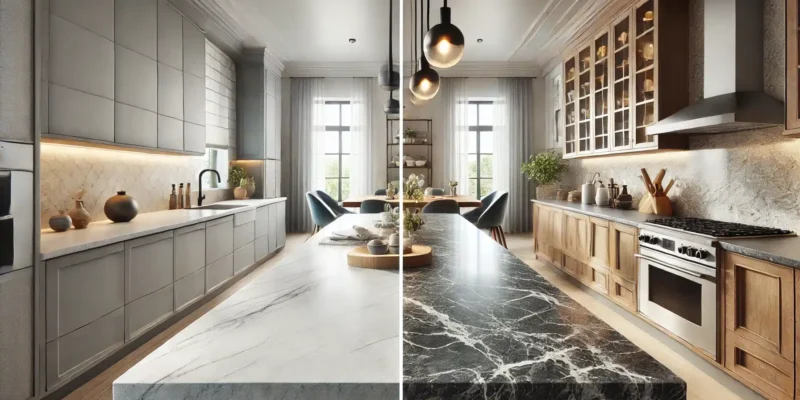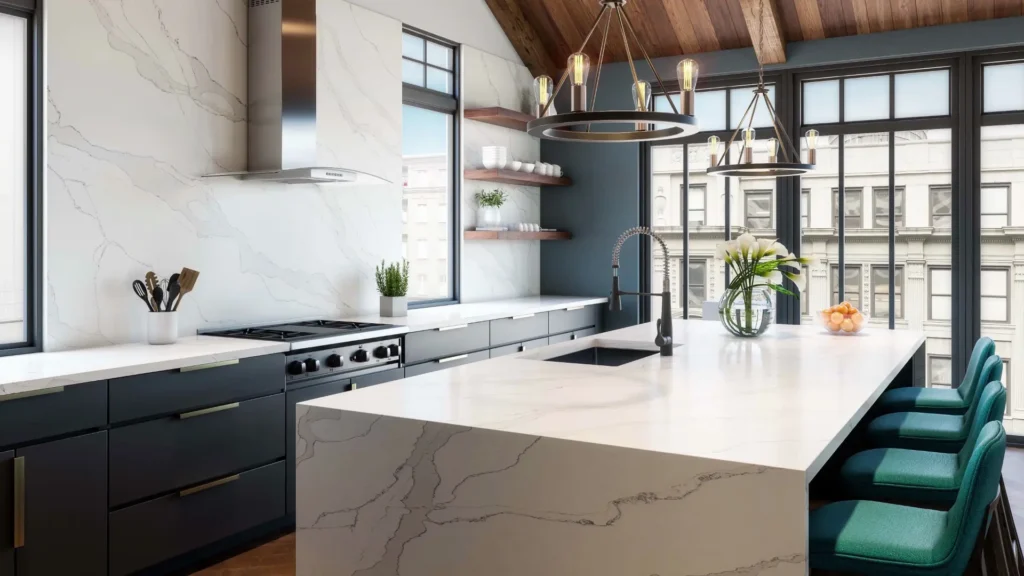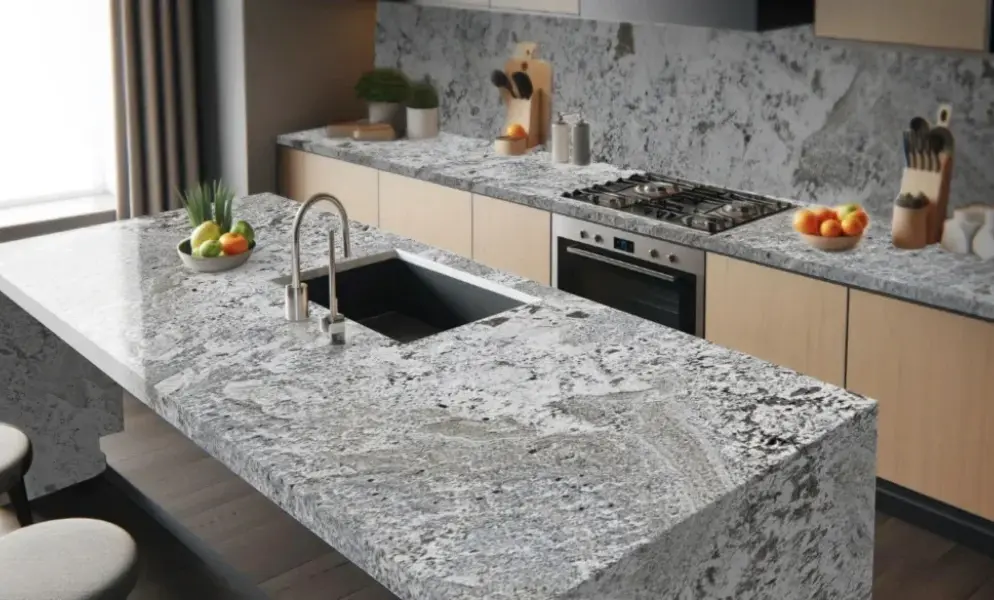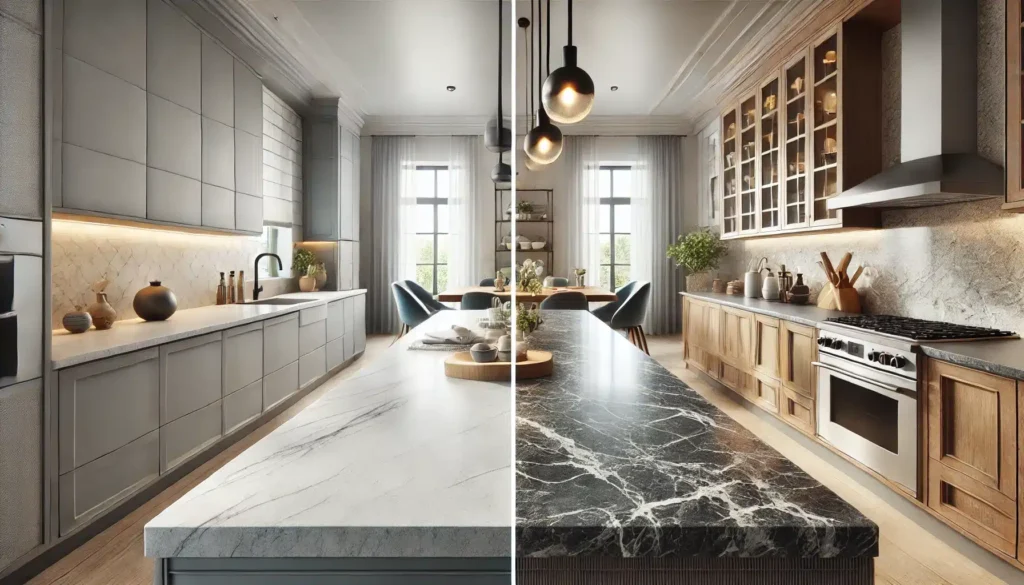


When it comes to kitchen renovations in Ontario, one of the most common questions homeowners face is whether to choose engineered stone vs natural stone countertops. Both options bring unique advantages to the table, but the right choice depends heavily on lifestyle, budget, and design preferences. With 2025 kitchen trends emphasizing both durability and elegance, understanding the differences between these two materials is more important than ever.
Engineered stone, often referred to as quartz, is a man-made material crafted from natural quartz crystals combined with resins and pigments. This process creates a highly durable, non-porous surface that resists stains, scratches, and bacteria. Its uniform appearance and wide color selection make it especially popular among modern homeowners in urban areas like Toronto and Mississauga.
Natural stone, on the other hand, includes timeless classics such as granite, marble, and quartzite. Each slab is one-of-a-kind, featuring unique veining and color variations that no engineered product can fully replicate. For Ontario homeowners who value individuality and natural beauty, natural stone continues to be a sought-after choice—especially in luxury homes across Oakville, Vaughan, and Ottawa.
The debate between engineered stone and natural stone has become even more relevant in Ontario’s competitive housing market. Homeowners are increasingly conscious of long-term value, maintenance requirements, and eco-friendly materials. With kitchen remodels ranking among the top investments for boosting property resale, choosing the right countertop material is a decision that can directly impact both daily living and future ROI.
In recent years, engineered quartz has gained tremendous popularity in Ontario due to its consistency, warranties, and ease of maintenance. However, natural stone continues to hold its ground in the luxury segment. Buyers of million-dollar homes in Toronto and Muskoka often expect real granite or marble, appreciating its unmatched authenticity and natural charm.
While both materials deliver beauty and durability, they cater to different needs. Families who want a hassle-free surface often lean toward engineered quartz. Meanwhile, homeowners who see their kitchen as a design statement often choose granite, marble, or quartzite to make a lasting impression.
In 2025, Ontario’s kitchen design trends reveal a fascinating split:
Countertops are not just about cooking surfaces—they set the tone for the entire kitchen. In Ontario, where open-concept kitchens are common and the kitchen often doubles as an entertaining space, the choice between engineered stone and natural stone can influence the entire feel of a home. Beyond style, practical factors such as winter durability, humidity resistance, and ease of cleaning also play critical roles.
As we move deeper into 2025, understanding the real pros and cons of engineered stone vs natural stone countertops is the first step toward making a confident and informed choice. In the next sections, we’ll explore durability, maintenance, cost, and design in detail—helping you decide which material best suits your Ontario home.

When Ontario homeowners weigh the choice between engineered stone vs natural stone countertops, durability and maintenance quickly rise to the top of the list. After all, a countertop isn’t just about looks—it has to withstand daily cooking, cleaning, spills, and the unique climate challenges of Ontario. From freezing winters to humid summers, Ontario kitchens demand surfaces that can perform year-round while still looking beautiful.
One of the main reasons quartz (engineered stone) has surged in popularity is its impressive durability. Engineered quartz is made by combining natural quartz crystals with resins, creating a surface that is non-porous and highly resistant to scratches and stains. Families in Toronto and Ottawa, where kitchens often serve as the hub of daily activity, appreciate quartz for its ability to withstand heavy use without showing wear.
Natural stone, however, is no less impressive in its own way. Granite, for example, is one of the hardest natural materials available for countertops. Properly sealed granite can last decades, resisting heat, scratches, and chips. Marble and quartzite are also strong but come with caveats—marble is softer and prone to etching, while quartzite combines the hardness of granite with the elegance of marble, making it highly desirable in upscale Ontario homes.
For busy Ontario households, maintenance is often the deciding factor. Quartz countertops are virtually maintenance-free. Because they are non-porous, they do not require sealing, and cleaning can be as simple as using mild soap and water. For families in Mississauga condos or Toronto high-rises, this convenience is a major selling point.
Natural stone, while stunning, requires more attention. Granite should be sealed every 1–2 years to maintain its stain resistance. Marble, beloved for its timeless elegance, demands even greater care, including more frequent sealing and immediate cleanup of acidic spills like wine or lemon juice. Homeowners who don’t mind the extra upkeep often choose marble as a statement of luxury, particularly in larger homes in Oakville or Vaughan.
Quartzite falls somewhere in the middle: it’s a natural stone, so sealing is still required, but it offers better durability than marble. For Ontario homeowners who want the authenticity of stone without the constant upkeep, quartzite has become increasingly popular.
Ontario’s climate adds another layer of consideration. Winters are cold and dry, while summers can be hot and humid. These shifts can impact countertop materials differently, especially in outdoor kitchens or cottages around Muskoka and Lake Ontario.
At Teccorp Stone, we’ve seen how these durability and maintenance factors play out in real projects. In Toronto condo renovations, quartz countertops are often the top choice due to their sleek look and minimal upkeep. In suburban homes in Markham or Burlington, granite remains highly popular because it balances natural beauty with excellent long-term performance. For homeowners in luxury areas like Oakville or Muskoka cottages, quartzite has gained traction as a material that delivers both authenticity and resilience in Ontario’s demanding climate.
Ultimately, if you’re looking for convenience, engineered quartz is the clear winner. It’s ideal for busy families, professionals, or rental properties where maintenance is a concern. However, if you value authenticity and don’t mind the extra care, natural stones like granite or quartzite offer unmatched beauty and longevity. The decision often comes down to whether you prioritize ease of living or the unique charm of nature’s designs.
In short, for Ontario kitchens in 2025:
As we’ll explore in the next section, design and cost considerations play just as important a role as durability. Whether you’re renovating a condo in downtown Toronto or upgrading a family home in Ottawa, understanding how engineered stone vs natural stone countertops compare in both style and budget will help you make the smartest choice for your home.

When choosing between engineered stone vs natural stone countertops in Ontario, most homeowners are not just thinking about durability—they are equally concerned with design options, overall style, and cost. After all, countertops are one of the most visible elements in a kitchen, shaping both the mood and the functionality of the space. In Ontario’s real estate market, where kitchens often make or break a buyer’s impression, the style and material of your countertop can significantly influence property value.
One of the biggest advantages of quartz (engineered stone) is its design versatility. Because it is manufactured, quartz offers consistent patterns, colors, and finishes. For modern condos in Toronto or Mississauga, homeowners often prefer the clean, uniform look of engineered quartz because it pairs perfectly with contemporary cabinetry and minimalist interiors.
This consistency is especially attractive for high-rise condos in downtown Toronto, where design precision is key to maximizing smaller kitchens. Homeowners love that quartz can provide a high-end look without the unpredictability of natural variations.
Natural stone, on the other hand, brings authenticity and uniqueness that engineered products cannot replicate. No two granite or marble slabs are ever the same, meaning your countertop becomes a one-of-a-kind feature in your Ontario home. This is particularly desirable in luxury areas like Oakville, Vaughan, or Muskoka cottages, where homeowners want to showcase individuality.
The unpredictability of natural stone is a selling point for many, but it can also be a drawback for homeowners who want a uniform appearance. Choosing slabs in person is highly recommended to ensure you’re happy with the natural variation.
Price is often the deciding factor for Ontario homeowners, especially in 2025 where kitchen renovations are a significant investment. While both engineered and natural stones can be considered premium surfaces, the costs vary depending on the specific material, availability, and installation complexity.
| Material | Average Cost (Installed, per sq. ft.) | Style Appeal | Best For |
|---|---|---|---|
| Quartz (Engineered) | $70 – $150 | Modern, consistent, versatile | Condos, busy families, low-maintenance kitchens |
| Granite | $80 – $170 | Bold, natural, timeless | Suburban homes, luxury buyers, outdoor kitchens |
| Marble | $90 – $200+ | Classic luxury, high-end elegance | Luxury homes, statement kitchens |
| Quartzite | $100 – $220+ | Exotic, rare, highly durable | High-end projects, custom kitchens |
For budget-conscious Ontario homeowners, quartz is often the most cost-effective premium choice.
According to recent design reports, Ontario homeowners are leaning toward styles that combine function with approachable luxury. Quartz that mimics the look of marble is particularly popular in Toronto condos, while darker granite slabs are making a comeback in suburban homes where families want bold, dramatic kitchens. In Muskoka, natural stone like quartzite is often used to complement rustic, cottage-inspired interiors.
At Teccorp Stone, we’ve seen a shift among Ontario buyers who want countertops that balance practicality with visual impact. In Mississauga and Markham, quartz dominates mid-range renovations because it offers great ROI and ease of upkeep. In Oakville and Toronto’s luxury markets, however, buyers are increasingly drawn to exotic granite and quartzite, where exclusivity and individuality matter more than price.
Whether you’re upgrading a family kitchen in Ottawa or investing in a high-end property in Toronto, the decision often comes down to whether you value the controlled, predictable look of engineered stone or the timeless uniqueness of natural stone. Both deliver strong style statements—but they appeal to very different types of Ontario homeowners.

By this point, we’ve covered durability, maintenance, style, and cost when comparing engineered stone vs natural stone countertops in Ontario. Still, homeowners often have very specific questions before making their final decision. In this section, we’ll answer the most common FAQs from Ontario buyers and provide expert recommendations to help you choose the perfect countertop material for your home in 2025.
Quartz (engineered stone) is often more resistant to stains and scratches than marble or some types of granite because of its non-porous surface. However, high-quality granite and quartzite are incredibly strong and can withstand heavy use. If durability with low maintenance is your top priority, quartz is usually the better choice for busy Ontario households.
Yes. While quartz has grown in popularity, natural stones like granite, marble, and quartzite remain highly desirable in Ontario. Many luxury homeowners specifically seek natural stone for its one-of-a-kind look and timeless appeal, especially in high-end markets such as Oakville, Toronto, and Vaughan.
This depends on perspective. Natural stone is a product of the earth and requires minimal processing, but quarrying and transporting slabs can leave a carbon footprint. Engineered stone often contains recycled materials and can be produced closer to demand, but it does involve resins and chemicals in its manufacturing. For eco-conscious Ontario buyers, it’s worth asking suppliers about sourcing and sustainability certifications.
Both quartz and granite significantly boost resale value in Ontario homes. Quartz is often seen as more modern and low-maintenance, which appeals to younger buyers in urban markets. Granite and quartzite, however, are more attractive to buyers looking for natural beauty and uniqueness. Marble is more niche but carries strong luxury appeal when marketed properly.
Quartz does not require sealing, which is one of its biggest advantages. Granite, marble, and quartzite do require periodic sealing to protect against stains and etching. The sealing process, however, is straightforward and typically only needs to be done once every 1–2 years. Many Ontario homeowners find this a reasonable trade-off for the beauty of natural stone.
Quartz is usually the top choice for small kitchens in Toronto condos or Mississauga apartments because of its sleek, consistent appearance and low maintenance. Natural stone can make a smaller kitchen feel luxurious, but variation in veining may make the space feel busier if not designed carefully.
On average, quartz costs between $70 – $150 per sq. ft. installed, while granite ranges from $80 – $170. Marble and quartzite are generally more expensive, starting around $90 and going up to $220+ per sq. ft. For homeowners renovating mid-range kitchens, quartz is usually the most budget-friendly premium choice, while natural stone is preferred for luxury projects where individuality matters more than cost.
Yes, modern quartz manufacturing has advanced so much that some slabs convincingly replicate marble or granite veining. While it won’t fully capture the depth and authenticity of real stone, it’s a great option for homeowners who love the marble look but don’t want the maintenance.
At Teccorp Stone, we often guide Ontario homeowners through this exact decision. Ultimately, the best choice depends on your lifestyle, design preferences, and budget. Here’s how we break it down:
For homeowners in Toronto and Mississauga, quartz remains a safe investment for resale and everyday practicality. In Oakville, Vaughan, and Muskoka, natural stone—especially granite and quartzite—often delivers higher aesthetic and emotional value. Both choices, when installed professionally, will elevate your kitchen and add long-term value to your property.
If you’re still undecided, visit a stone showroom in Ontario to see slabs in person. Pictures online don’t capture the full effect of natural stone, and engineered stone samples often look different in large installations. At Teccorp Stone, we recommend comparing slabs side by side under natural light to truly appreciate their differences.
So, is engineered stone better than natural stone? The answer depends entirely on your priorities. For a stress-free, modern kitchen, quartz may be your perfect match. For a timeless, unique, and natural luxury look, granite, marble, or quartzite will never go out of style. Either way, Ontario homeowners can feel confident knowing that both options are excellent investments in 2025 and beyond.